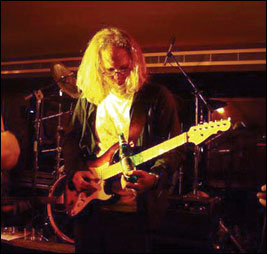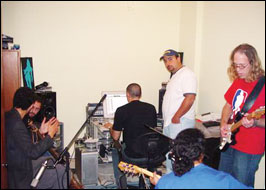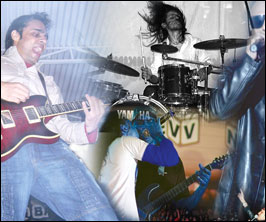|
|
| |
Looking for heavy metal in the Muslim
world
From an author, linguist (of seven languages including Arabic
and Persian), historian, journalist, musician and professor (of
Middle Eastern history/culture, and Islamic studies - at the
University of California-Irvine), Mark LeVine visited Pakistan
recently, this year.
For research purposes regarding contemporary, Pakistani music
and its significance on the general public (for his latest book,
Heavy Metal Islam: Rock, Religion and Resistance Among Islam's
Generation Next), LeVine had extremely insightful views and observations
concerning Pakistan's current music set-up. In an interview with
Instep, Mark shared his experiences and candid sentiments about
contemporary music and it precarious status in the Muslim world.
By Sonya Rehman
|
| |
Instep:
Could you elaborate on what the basis for your research was on?
ML: My main reason was to understand the development of popular music
and its relationship to the rest of society in Pakistan, especially
heavy metal and other forms of hard rock.
One of my main areas of research is the conflicts that often occur
between rock/metal musicians and conservative religious forces. In
Pakistan this is a key issue, as conservatives (or radicals, as the
case may be) have threatened to attack, and in some cases carried
out attacks on stores that sell popular music, or venues that allow
live music, etc. So I wanted to see how Pakistani musicians were coping
with the situation and what could be done to help them. |
 |
| |
Instep:
What prompted you to get involved in a project such as this one?
ML: For me, music, especially seemingly marginalized music in the
Middle East/Muslim world like heavy-metal or rap is actually a great
prism to understand the larger dynamics of oppression, censorship,
authoritarianism, etc. in society. 'Metal-heads' to me are a canary
in the coal mine for testing the level of democracy and a functioning
public sphere more broadly.
As goes heavy metal, so goes Pakistan, one could say. What I found,
was extremely complex, confusing, paradoxical and ultimately hopeful.
Yes, the Salafis are attacking artists and purveyors of popular culture/music
- but at the same time, the vast majority of Pakistani's love popular
culture and love their rock n' roll. I mean, in Pakistan there are
almost a dozen music video channels and the music scene in terms of
quality and originality is the best in the Muslim world, as far as
I'm concerned. |
| |
Instep:
Which Pakistani musicians did wind up meeting on your trip here, and
what were their personal sentiments regarding this issue?
ML: I met Mekaal Hasan, Haroon, Arieb Azhar, Ali Rooh, Mizraab, Aaroh,
Karavan, Akash, a few underground metal bands, and of course Salman
Ahmed, who was a big help.
Basically, most of them don't want to be directly involved in politics
these days because while they don't like the present government much,
they feel it has at least allowed a flowering of popular music –
which stands in sharp contrast to what the Salafis want to do.
|
 |
| |
Also,
as many mentioned, it's not like the so-called democratically elected
governments of Bhutto and Sharrif were any less corrupt or violent
or oppressive than the present.
In fact, from a musician's perspective, Musharraf is better. What
this shows me is that Musharraf's strategy of giving artists more
room to work has been quite smart because now they have a stake in
the system. So now it seems the government is not a major issue.
The main threat is the Salafis. Also important is that the music industry
in Pakistan is so DYI. With the increasingly inexpensive recording
technologies at peoples' disposal, any band can record a CD-quality
demo, do a video for a couple of thousand dollars, send it to the
local music channels, and if it clicks, they're famous.
This really changes the environment regarding censorship-related issues. |
| |
Instep:
That's true, in Pakistan the music scene is very DYI – what's
it like for Western artistes abroad though? What do foreign musicians
need to do to 'get famous'?
ML: You know, I don't work with Western artistes anymore except through
the world music artistes I work with. I think in terms of the recording
technologies, yes, the same thing is happening - and it's amazing
and represents a real democratization of the music industry.
But the difference is with the videos. It still costs a lot more in
terms of labour to shoot a video…and then the idea of just sending
your video to a music channel unsolicited, and knowing it'll be aired
- seems a bit far-fetched. But that's the way it works in Pakistan. |
 |
| |
|
Instep: Okay so honestly, what did you think
of our country's music scenario?
ML: Well, there's certainly some cheesy pop music, but no worse
than the Arab world or Iran. I think in terms of rock - not metal
specifically, but rock and hard rock, Pakistan's is by far the best
scene in the world right now to my ears, because it is so hybrid,
it so effortlessly blends together the best of the rock tradition
and of local Pakistani styles. From qawwali to classical Indian,
and to tribal music. And bands in Pakistan even sing metal in Urdu,
which is unheard of in the Arab world!
Instep: From your travels for research purposes,
have you ever happened to encounter any band/musician that is a
'worst case' example of oppression in the Muslim world?
ML: I haven't met any musicians who've been killed or tortured in
jail, although I'm certainly aware of people to whom this has happened.
I guess Iran has been the worst, in that most every Metal-head I
met (who had long hair) told me stories of being beaten, arrested
and the like by police or Revolutionary Guards ('Basij') just for
walking down the street with long hair.
In Egypt and Morocco I know many musicians who were arrested, and
perhaps roughed up a bit, and in Lebanon I've met musicians who
were brought in for questioning by the police because they were
into metal music.
Instep: How can orthodox religion and heavy
metal/rock reach a 'settlement' in your opinion?
ML: Well, probably 'orthodox' religion can't come to terms with
metal, just as it can't come to terms with anything else besides
its own interpretation of its religious tradition. That's the same
for Christianity or Judaism or Hinduism, as for Islam.
But the reality is that all religions are very complex and diverse.
That's why there is Christian metal, Islamic Hip-hop, etc. In terms
of metal in the Middle East, the reality is that the Salafi types
will never accept it unless they can use it as a tool for propaganda
- in other words, if some metal kids wrote a death metal song supporting
Al-Qaeda or something. But a whole new generation of Islamists has
emerged that is much more culturally open and less concerned about
policing people's musical habits than they are about fighting authoritarian
regimes. Not to mention that many musicians are themselves religious,
and, as one Egyptian Metal-head described it to me with a laugh,
will "go to Juma prayers on Friday and then go play black metal
for four hours", with his band.
As one young leader of the Muslim Brotherhood said to me when I
asked him if one could be a good Muslim and a good Metal-head, he
said: "We want to confront the regime - not to impose Shariah
or wage jihad against the West or Israel - but to bring real democracy
and social justice to Egypt and the region as a whole." He
then continued, "Here's the thing I know: If I fight just for
myself and my rights, then I'll never get them. Only if and when
I'm ready to fight for everyone's rights can I hope to have my full
rights as a religious Muslim in Egypt."
This is a radically different approach to politics than has traditionally
existed among Islamists in the Muslim world, who haven't been too
interested in the rights of other oppressed groups in their societies,
particularly those that don't follow their conservative views on
religion and morality. It's also an invitation to dialog which many
secularists, especially artists, have been slow to accept. But that's
a dangerous strategy because sooner or later authoritarian governments
always go after artists, and they'll need all the allies they can
get.
"I
think in terms of rock - not metal specifically, but rock and hard
rock, Pakistan's is by far the best scene in the world right now
to my ears, because it is so hybrid, it so effortlessly blends together
the best of the rock tradition and of local Pakistani styles. From
qawwali to classical Indian, and to tribal music. And bands in Pakistan
even sing metal in Urdu, which is unheard of in the Arab world!"
- Mark LeVine
|
| |
|

